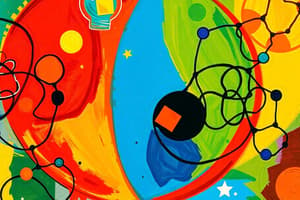Podcast
Questions and Answers
What step is typically performed after forming a hypothesis in the scientific method?
What step is typically performed after forming a hypothesis in the scientific method?
- Making observations
- Analyzing data
- Conducting experiments (correct)
- Drawing conclusions
What is the main characteristic of scientific laws?
What is the main characteristic of scientific laws?
- They explain the reasons behind observed phenomena.
- They predict the behavior of systems with high accuracy. (correct)
- They are based solely on theoretical assumptions.
- They evolve with every new observation made.
Which statement best describes scientific theories?
Which statement best describes scientific theories?
- They are unchanging and cannot adapt to new evidence.
- They are based on isolated observations without experimentation.
- They are merely guesses about natural phenomena.
- They explain the 'why' behind scientific laws. (correct)
In which branch of science would you investigate living organisms and their processes?
In which branch of science would you investigate living organisms and their processes?
What is a key component of experiments designed to test hypotheses?
What is a key component of experiments designed to test hypotheses?
What do scientific principles provide to scientific inquiry?
What do scientific principles provide to scientific inquiry?
Which of the following is an example of quantitative data?
Which of the following is an example of quantitative data?
How are scientific conclusions treated in the scientific community?
How are scientific conclusions treated in the scientific community?
Flashcards
Scientific Method
Scientific Method
A systematic approach to understanding the natural world, involving steps like observation, hypothesis formation, experimentation, data analysis, and conclusion.
Hypothesis
Hypothesis
A testable explanation for an observed phenomenon.
Experiment
Experiment
A procedure designed to test a hypothesis, often using control groups and variables.
Scientific Law
Scientific Law
Signup and view all the flashcards
Scientific Theory
Scientific Theory
Signup and view all the flashcards
Natural Sciences
Natural Sciences
Signup and view all the flashcards
Physical Sciences
Physical Sciences
Signup and view all the flashcards
Biological Sciences
Biological Sciences
Signup and view all the flashcards
Study Notes
Scientific Method
- Science is a systematic approach to understanding the natural world.
- The scientific method involves a series of steps to investigate phenomena.
- These steps often include observation, forming a hypothesis, conducting experiments, analyzing data, and drawing conclusions.
- The scientific method is iterative and can be modified or repeated as needed.
- Hypotheses are testable explanations for observed phenomena.
- Experiments are designed to test hypotheses, often using control groups and variables.
- Data collected during experiments should be quantitative or qualitative, and documented meticulously.
- Data analysis involves interpreting the collected data.
- Scientific conclusions are based on the evidence gathered and are subject to revision based on further research.
Branches of Science
- Science is broadly categorized into various branches, each focusing on specific aspects of the natural world.
- Natural sciences often investigate physical phenomena and the natural world.
- Physical sciences involve the study of matter, energy, and their interactions, including physics, chemistry, and astronomy.
- Biological sciences, or life sciences, investigate living organisms, including evolution, genetics, and ecology.
- Earth sciences explore the planet Earth: its composition, processes, and history, including geology, meteorology, and oceanography.
Scientific Laws
- Scientific laws describe observed phenomena and predict their behavior with high accuracy.
- They are based on numerous observations and experiments and summarise well-established patterns.
- Examples of scientific laws include Newton's laws of motion.
- Scientific laws often describe fundamental principles of nature that remain consistent under varied conditions.
- They do not explain the reasons behind the observed patterns.
Scientific Theories
- Scientific theories are explanations of natural phenomena that are well-supported by evidence.
- They explain the "why" behind scientific laws and have the ability to predict future observations.
- They may evolve or be modified as new evidence emerges.
- Example - the theory of evolution explains the diversity of life on Earth by means of natural selection.
- They are not just guesses but well-substantiated explanations.
Scientific Principles
- Scientific principles are fundamental concepts widely accepted within the scientific community.
- They guide scientific inquiry and provide frameworks for understanding phenomena.
- They are derived from vast bodies of knowledge and multiple successful experiments.
- Examples of scientific principles include the principle of conservation of energy.
- These principles provide robust and tested explanations.
Studying That Suits You
Use AI to generate personalized quizzes and flashcards to suit your learning preferences.




